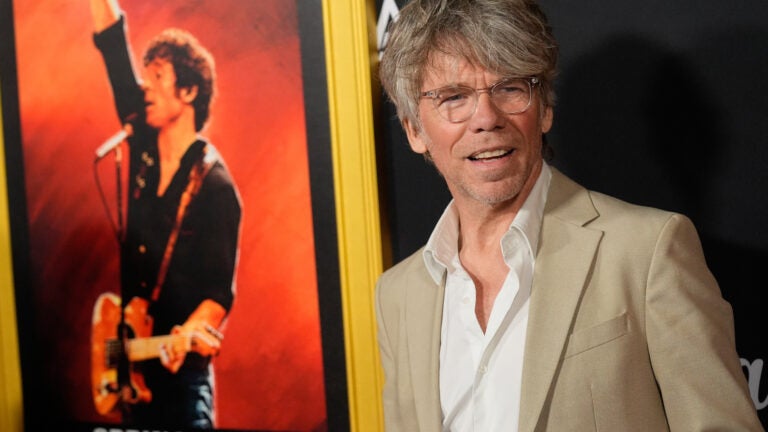Books
The once (and future?) Del Fuego talks fatherhood, human art in the age of AI, and watching his book land on screen.

In all my conversations with Warren Zanes over the years — whether we’re talking his Tom Petty biography or Del Feugos reunion shows — two names pop up frequently:
Piero and Lucian. His sons.
The Concord, New Hampshire native/Del Fuegos alum wears many hats — author, bonafide rock star, college professor — but you sense he self-identifies as Dad.
“I always talk about my sons because that’s what I orbit around. Those guys know they have something I never had: a father they can reach out to,” Zanes, 60, tells me in our recent phone interview.
“My father, I met him less than a dozen times. He lived near me for a period. He could’ve reached out. I never saw him,” he says. “I brought Lucian and Piero to meet him once. That was it. Then he died.”
The year Zanes’s father died, Zanes lost a job. His second marriage came apart. A global pandemic soon started.
Zanes reached for the raw, quietly powerful album he’d reached for in all the toughs times in his life since he was “a scholarship kid, twice asked to leave” at Andover’s Phillips Academy in 1982: Bruce Springsteen’s 1982 “Nebraska.”
The result was his 2023 book: “Deliver Me from Nowhere: the Making of Bruce Springsteen’s Nebraska.”
Underneath Springsteen’s own struggle lay a fraught relationship with his father, Doug.
That father-son relationship is explored in “Springsteen: Deliver Me from Nowhere,” the film adaptation of Zanes’s book, in theaters now.
Directed by Scott Cooper, it stars Jeremy Allen White (“The Bear”) as Springsteen, “Succession” star Jeremy Strong as Springsteen’s manager, Jon Landau, and Stephen Graham — who co-wrote/co-created/ starred in the brilliant Netflix series “Adolescence” about a father and son — as Springsteen’s dad.
Zanes first saw the movie alone, in a 150-seat theater.
“It was very intense,” he tells me. “My favorite movie candy is Dots. People laugh at me, but I love Dots. I’m in the theater with my box of Dots, and I put them down on the floor with my car keys, and the movie starts. I got to the end, the credits are rolling, and I hadn’t eaten my Dots. And my children won’t believe that.”
The Dots-lover’s second screening was with his oldest son Lucian, 23, and his third with Piero, 21.
“There are branches of emotion in the movie, but a larger branch has to do with fathers and sons. You see a father and son come through some real trouble — not to live happily ever after, but to understand one another just a little bit more,” Zanes says. “And a little bit more is a lot. I never had that.”
‘That companionship carried me’
In the end, maybe Bruce Springsteen’s 1982 raw, unedited, self-recorded “Nebraska” — made alone in a bedroom, months from a breakdown — boils down to a broken father-and-son bond, a child desperate to heal.
Art that comes from scars that deep — that human— can hit other humans going through the same hurt. Can hit like a drug, straight into the bloodstream with a message we all need so badly: You are not alone.
“That companionship carried me,” Zanes tells me. “When I’m going through sh** in my life, listening to songs of hopelessness and violence and despair, I am less alone. That’s the redemption. The redemption is in the act of reception.”
Art like this springs from a mysterious font. It’s ancient and purely human. A caveman’s howl. We receive it in our bones.
“Even Bruce Springsteen can’t explain ‘Nebraska.’ When the album came out, he didn’t want to do interviews because he didn’t want to explain it — he didn’t think he could. And I think there’s still some of that in the works here,” Zanes tells me.
“It’s a mysterious album he put out into the world. It got into people’s bloodstream. On some level, I think Bruce is with us, watching this quiet album do these big things and represent the power of the flawed. The power of the imperfect, the power of the raw.”
After Springsteen texted Zanes that he was into the movie idea, wheels moved fast, and the lights were bright. An A-list cast. Telluride debut. Heck, Springsteen landed back on the cover of TIME because of this.
It’s hard for Zanes to comprehend the magnitude. But he’s not getting a big head.
“There’s all this perspective-making machinery at work,” he says, rattling off a list of dad-duties and teaching assignments on his to-do list — and adding that on set, his name was misspelled on his director’s chair.
With opening weekend upon us, I had more questions for Zanes. In a wide-ranging interview, we talked Al Pacino, fatherhood, AI, and the dignity of the flawed.
Interview has been edited and condensed.
Lauren Daley/Boston.com: I’m excited to talk to you about it this. l feel like I’ve followed this story from the seed to flower.
Warren Zanes: You have. You’ve been on the ride. You know, if time-travel was possible and you could go back to 1982 when Bruce Springsteen was deciding to put out self-recorded bedroom demos out as his sixth official release, and tell him: “43-some years from now, 20th Century Studios will make a movie about what you just did,” he would not believe it, and he would have no reason to believe it.
The scale of this [film], relative to the scale of “Nebraska,” is so moving to me. Because talk about underdog stories — Bruce Springsteen in 1982 was not an underdog, but “Nebraska” was. So to see this happening — it’s moving to me.
I bet. You must’ve had no inkling it would land like this.
Not at first. I started to get a sense [after casting]. Bruce already sits in a high place in the global collective imagination. Then Scott Cooper and his films are in an upwards trajectory. Then Jeremy Allen White and Jeremy Strong— their work has been so consistently good, they’re ascendant. You begin to go, “This could be very visible.” Then it happens, and you go: “But I never thought it would be this visible.”
“Nebraska” came out like a challenge. When Springsteen didn’t do interviews, when he didn’t tour, he didn’t explain it, he made us think about listening itself.
Once Bruce made the decision to release it, it was done. He couldn’t change a lyric, recut a vocal, fix pitch. To let that come out — it’s an intense move. And sometimes flaws tell us more about the person we’re talking to than anything else. We started making records that got increasingly perfect. We got into a position where we started to know less and less about the person making those records, because they’d cleaned them up so much.
We live in an age of plastic surgery, Photoshop, AI — a world that allows us to fix everything. Look at pictures of Al Pacino — he looks his age! We’ve become so unaccustomed to seeing people look their age. There is a dignity in being who you are without being tidied up. “Nebraska” is the untidy.
The dignity of the untidy. That’s good.
The movie takes us behind that, into the personal world, where we see a guy hitting bottom. Not everybody comes through those moments — but he does. “Nebraska” resonates as this document that comes from that very moment.
It’s really born of that pain. And I love what you were saying about Pacino — we’re so used to plastic and technology that we’re surprised to see an 80-year-old human look like an 80-year-old human. “Nebraska” feels like the antithesis of everything we’re being inundated with right now. This refreshing reminder of human-made art.
And there’s still a lot of Springsteen fans who don’t know “Nebraska” well. When I think of the Dylan or Queen biopics, they involve high points. “Like a Rolling Stone” — that was Dylan’s biggest charting song. This is not about “Born in the USA.” That’s not to say, “Oh, this is a better movie because it’s not the high point.”
But for me personally, success is a compelling story – but survival is even more interesting.
I love that. Fathers and sons are a major theme here. I read in Variety that Springsteen said Stephen Graham really captured his father.
You know, I had an email from Bruce’s cousin Glen — he said “Stephen Graham is Dougie,” meaning Bruce’s father. And on that set, only Bruce and Jon Landau knew Douglas Springsteen. Stephen Graham was building a character through what we know from Bruce, and some pictures. Nothing else.
There were days when Bruce left set early. And when that happened, you knew why. Because something happened — something powerful enough that he went home.
Wow. I know you were on set often. Any moments that struck you?
If I had to pick one moment where I felt the movie coming alive, it was watching Jeremy Allen White and Jeremy Strong work together for the first time. It was in a diner in Newark. To see Jeremy Strong going off-script — not to suggest that he didn’t cover the material in the script, but he would almost start before they called action. He was Jon Landau. His research was so deep that he was speaking about things that weren’t in the script that he’d interiorized.
And the way he made Jeremy Allen White laugh even before they called action — that was the way Bruce laughs at Jon. It was uncanny.
Wow. And Jeremy Allen White did do his own singing.
Scott sent me I think “Mansion on the Hill” early on. I initially thought he was joking. I thought he was messing with me.
[laughs] I thought the same thing when I first heard clips online. It’s unreal. And your students must be freaking out over this.
Three classes went by before I mentioned, “I’m going to be getting a little busy for a few weeks because of this movie.” One said: “You mean this movie is based on your book!?”
[laughs]
That’s where you feel the impact of the way this thing is going into the world — they all knew it. Otherwise they’re not collecting Warren Zanes books.
[laughs] Overall, what would you hope people take from the movie?
I think about my sons, and I want them to see stories of people hitting bottom and taking a chance to grab the shards and rebuild themselves, as something new and truer to who they are.
Warren Zanes and the Del Fuegos will reunite for two “Home for the Holidays” reunion shows on Saturday, Dec. 20, 3 p.m. and 7:30 p.m., at City Winery Boston.
Lauren Daley is a freelance culture writer. She can be reached at [email protected]. She tweets @laurendaley1, and Instagrams at @laurendaley1. Read more stories on Facebook here.
Sign up for the Today newsletter
Get everything you need to know to start your day, delivered right to your inbox every morning.




